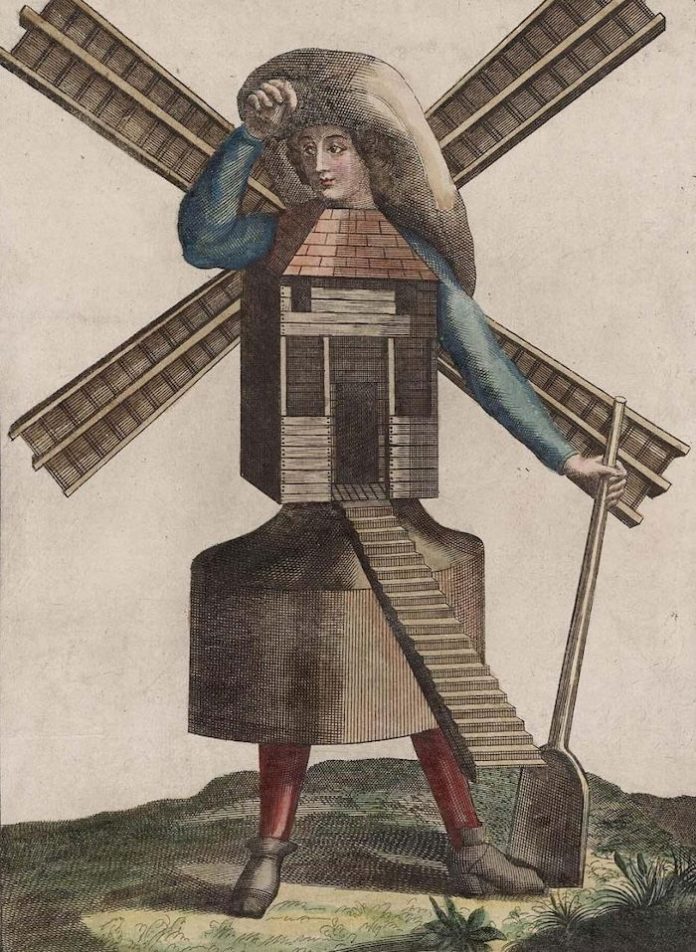By the end of the medieval period millers had poor reputations. Chaucer’s miller in the Canterbury Tales was coarse, vulgar, and habitually dishonest – he told ‘tavern stories, filthy in the main’ and was ‘a master-hand at stealing grain’. These stereotypes have cast a long shadow, reiterated in jest books, which described the collar of a miller’s shirt as ‘valiant … Because that everie morning it had a Thief by the neck’, and ballads, where lecherous millers were outfoxed by women who refused to marry ‘a Thief and a Miller’. But how did this stereotype come about?
Diets in early modern England were grain-based, consisting largely of bread, porridge, and beer. Before bakers, brewers, and householders could produce them, their grain had to be ground. Ground grain was quick to spoil, so grinding services had to be local, and every community therefore required a mill and miller. Despite their ubiquity their business was so mundane as to go unrecorded and they left few personal records. However, milling was regulated, and infringements of good practice were tried at local and national courts, particularly the Court of Exchequer – the records of which offer insight into the milling business and those behind the service.
A common accusation against millers in litigation was that they took excessive toll – a percentage of customers’ grain taken as payment – which had a significant impact on household economy. Therefore, it is unsurprising that the stereotypical miller, as exemplified in the ballad ‘Robin the Plow-man’s Courage’ (1675-96), was a ‘double Knave in grain’, who ‘out of a bushel a peck he will steal’. Some millers certainly were dishonest, accused at law of taking ‘another toll dyshfull’ of grain or, more subtly, as was the case at Merford Mill in 1630s Denbigh, creating a gap in the mill machinery through which grain could be ‘concealed and purloined’.
Their work rarely led to wealth, yet in ballads such as ‘The Witty Damsel of Devonshire’ (1675-96) millers were described as having ‘three or four Acres of Land,/ And also good Silver and Gold at command’ as often as they were ‘lowlie’ and ‘rude’, playing with the notion that they cheated in their trade. Millers who acted above their station got their comeuppance. Dick the miller in ‘Ill-gotten Goods seldome thrive’ (1647-65), for example, bought a ‘gallant Suit of Clothes’ with the triple toll he’d taken only to have them stolen by a cunning ‘Lasse’ whom he tried to seduce.
In reality, a miller’s wealth depended on the area the mill served, whether the mill had land which could be farmed, whether there were competing mills nearby, and whether it was the customary mill which local tenants and inhabitants were obliged to use. They rarely owned mills themselves, but rented them or were hired by lords or landowners. They thus found themselves serving two opposing masters – the mill owners, who expected significant profits and demanded high rates, and the communities the millers served, who expected an efficient and affordable service – and so became easy targets for accusations of malpractice. In Bovey Tracey, Devon, in a 1601 dispute between competing mills, John Coles claimed that the millers of the manor mills had ‘taken excessive toll’ because the mills were ‘att a verie high Rent’ which they could only make through ‘unjust meanes’.
Mills were dominated by men. Only a few women, mostly widows, worked mill machinery themselves. However, women were often customers: in legal depositions men described sending grain to the mill via their wives or servants rather than taking it themselves. Gilbert Jacson of Grantham, Lincolnshire, claimed in the 1580s that he never dealt directly with the mill ‘but committed the dealing therein whollye to his wyfe’, and in the 1620s John Newton only had knowledge of poor service at Burton upon Trent mills because of reports from his ‘wife and maidservant’. This meant that interactions at mills were often between male workers and female customers. Along with their isolated location, this made mills the perfect setting for tales of illicit assignations – which often made use of the metaphorical potential of the trade. In ‘The Lusty Miller’s Recreation’ (1672-96) a woman sends her three daughters to the mill with grist, each of whom falls ‘under the Stones with much pleasure’ and returns with ‘her Belly as full as her Sack’. In ‘Grist Ground at Last’ (c.1685) a female customer, Molly, finds the miller forlorn as he cannot make his mill ‘obey’, and so takes ‘the matter in hand’ and helps his ‘stones go round’ to get her grist ‘ground apace’.
The reality of interactions between millers and their neighbours, however, was dependent on interpersonal relationships and obligations, which maintained the extension of credit upon which the cash-poor early modern economy relied. Millers used mutual obligation to attract grist to their mills, usually at the expense of a nearby mill, which often resulted in legal action intended to prevent their rivals from operating. In 1620s Selby, Yorkshire, a miller was said to have become ‘well acquainted’ with owners of public houses to ‘oblige’ them ‘to bring their corne to his mill to grind’ rather than the manor mill. Millers’ reputations also relied on economic credit. In a similar dispute in Leominster in the 1600s, a shoemaker’s wife explained that her refusal to use the manorial mill was because the miller did not ‘buy his shooes with my husband’.
The stereotypical early modern miller faded with industrialisation and urbanisation. By the 19th century large steam mills were replacing water and windmills, expanding transport networks conveyed finer flour over much greater distances, and millers became merchant-millers, buying grain wholesale and selling the produce directly to shops and bakers. No longer poked fun at for community infractions, millers provoked new ire as industrial capitalists.
Mabel Winter is a Postdoctoral Research Associate on ‘The Politics of the English Grain Trade’ project at the University of Oxford.




